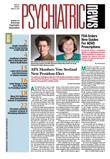Evidence of the increasing interest in spirituality and mental health can be found in the proliferation of research and clinical literature on the subject. A Medline search using the words “spirituality and health” returned more than 1,570 citations, approximately 750 of which were published within the last three years (see
page 10).
A similar search using the words “spirituality and mental health” returned 211 publications, the majority of which were also published since 2004.
“Some of the reasons can also be found in the recognition by clinicians of the relevance of spirituality and religion in 12-step addiction treatment programs, care of seriously ill and dying patients, the use of mindfulness and related interventions in approaches such as dialectical behavior therapy, and the treatment of the growing number of individuals who want a spiritual perspective incorporated into their care,” John Peteet, M.D., chair of APA's Corresponding Committee on Religion, Spirituality and Psychiatry, told Psychiatric News.
Peteet said psychiatry residencies have also developed courses for trainees on the subject. Many of these have been funded by the Templeton Foundation through the George Washington University Institute for Spirituality and Health (GWISH), he said.
The Templeton Foundation is a private philanthropic foundation dedicated, according to its Web site mission statement, to serving as a“ philanthropic catalyst for discovery in areas engaging life's biggest questions.”
According to its Web site, GWISH is an educational institution working toward “a more compassionate system of health care by restoring the heart and humanity of medicine through research, education, and policy work focused on bringing increased attention to the spiritual needs of patients, families, and the health care professionals.”
Peteet said APA's Corresponding Committee on Religion, Spirituality, and Psychiatry has been working on many tasks. Last year, activities of the committee included the following:
•
Presentation of the 2006 Oskar Pfister Award to Edwin Cassem, M.D.
•
Revision of the 1979 Guidelines Regarding Conflict Between Psychiatrists' Religious Commitments and Psychiatric Practice.
•
Co-sponsorship of the APA workshop “Can We Talk? A Model for Constructive Conversation Between Advocates and Opponents of Same-Sex Relationships” at APA's 2006 annual meeting in Toronto.
•
Collaboration with the American Psychiatric Institute for Research and Education on a monograph addressing religious and spiritual issues in the DSM-V revision process. The monograph is currently under review by American Psychiatric Publishing Inc. and is expected to be posted as a resource document on APA's Web site.
More information on the Templeton Foundation is posted at<www.templeton.org>. Information on GWISH is posted at<www.gwish.org>.
